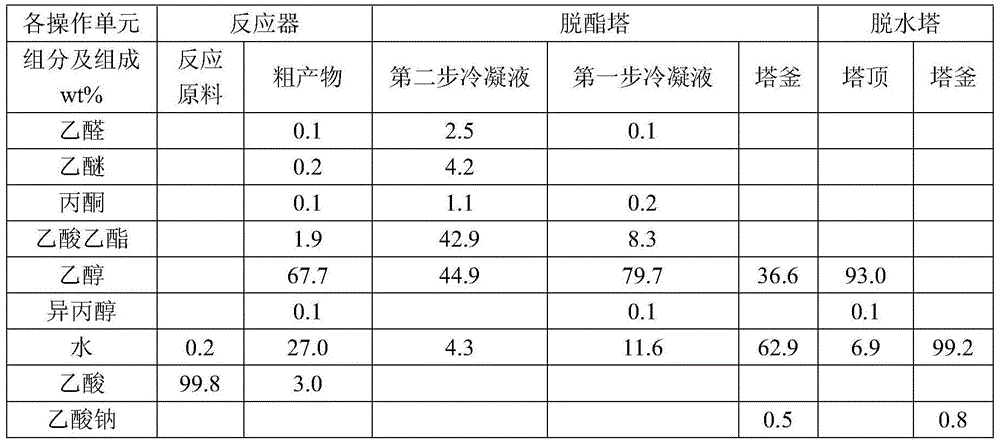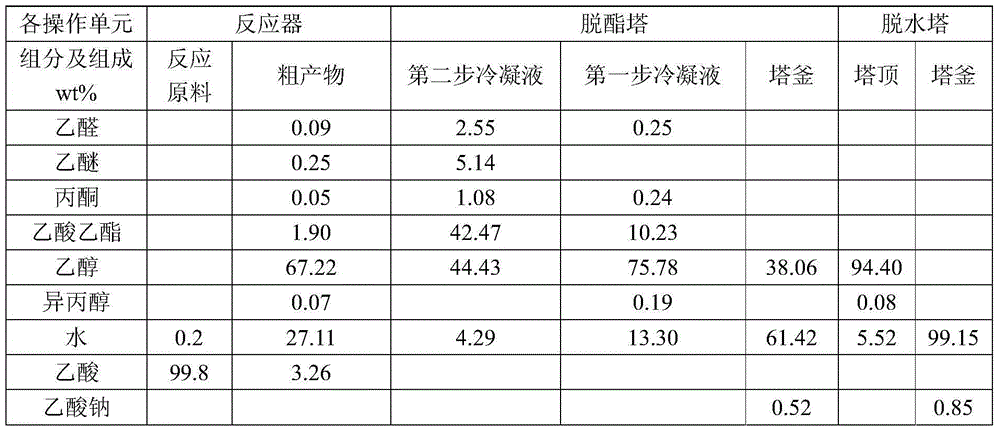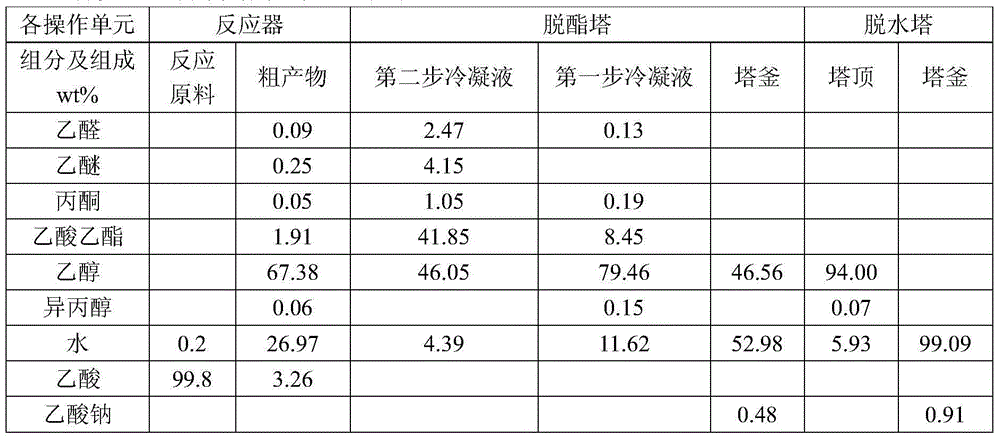Method for low-energy consumption acetic acid hydrogenation production of ethanol
A low energy consumption, acetic acid technology, applied in chemical instruments and methods, preparation of organic compounds, separation/purification of hydroxyl compounds, etc., can solve problems affecting the separation effect of the distillation tower, the pressure of the distillation tower, and the quality of ethanol products
- Summary
- Abstract
- Description
- Claims
- Application Information
AI Technical Summary
Problems solved by technology
Method used
Image
Examples
Embodiment 1
[0045] In this embodiment, the catalyst for acetic acid hydrogenation is the acetic acid hydrogenation catalyst produced by Beijing Research Institute of Chemical Industry, the brand is BC-E-20, and the catalyst contains: (1) cobalt, wherein the cobalt metal content accounts for 30wt% of the total weight of the catalyst ; (2) molybdenum and chromium, respectively accounted for 2wt% of the total weight of the catalyst; the balance is silicon oxide. The catalyst is prepared by co-precipitation.
[0046] The method for producing ethanol from acetic acid comprises the steps of:
[0047] (1) Hydrogenation: Preheat the acetic acid raw material and hydrogen, then make it pass through a reactor equipped with a hydrogenation catalyst, and hydrogenate acetic acid into crude ethanol product; the process condition of acetic acid hydrogenation is: the liquid phase volume of acetic acid The speed is 0.5h -1 , the molar ratio of hydrogen to acetic acid is 20:1, the reaction temperature is ...
Embodiment 2
[0053]In this embodiment, the catalyst for acetic acid hydrogenation is the acetic acid hydrogenation catalyst produced by Beijing Research Institute of Chemical Industry, the brand is BC-E-20, and the catalyst contains: (1) cobalt, wherein the cobalt metal content accounts for 30wt% of the total weight of the catalyst ; (2) molybdenum and chromium, respectively accounted for 2wt% of the total weight of the catalyst; the balance is silicon oxide. The catalyst is prepared by co-precipitation.
[0054] The method for producing ethanol from acetic acid comprises the steps of:
[0055] (1) Hydrogenation: Preheat the acetic acid raw material and hydrogen, then make it pass through a reactor equipped with a hydrogenation catalyst, and hydrogenate acetic acid into crude ethanol product; the process condition of acetic acid hydrogenation is: the liquid phase volume of acetic acid The speed is 0.75h -1 , the molar ratio of hydrogen to acetic acid is 15:1, the reaction temperature is ...
Embodiment 3
[0061] In this embodiment, the catalyst for acetic acid hydrogenation is the acetic acid hydrogenation catalyst produced by Beijing Research Institute of Chemical Industry, the brand is BC-E-20, and the catalyst contains: (1) cobalt, wherein the cobalt metal content accounts for 30wt% of the total weight of the catalyst ; (2) molybdenum and chromium, respectively accounted for 2wt% of the total weight of the catalyst; the balance is silicon oxide. The catalyst is prepared by co-precipitation.
[0062] The method for producing ethanol from acetic acid comprises the steps of:
[0063] (1) Hydrogenation: Preheat the acetic acid raw material and hydrogen, then make it pass through a reactor equipped with a hydrogenation catalyst, and hydrogenate acetic acid into crude ethanol product; the process condition of acetic acid hydrogenation is: the liquid phase volume of acetic acid The speed is 1.25h -1 , the molar ratio of hydrogen to acetic acid is 12:1, the reaction temperature is...
PUM
 Login to View More
Login to View More Abstract
Description
Claims
Application Information
 Login to View More
Login to View More - R&D
- Intellectual Property
- Life Sciences
- Materials
- Tech Scout
- Unparalleled Data Quality
- Higher Quality Content
- 60% Fewer Hallucinations
Browse by: Latest US Patents, China's latest patents, Technical Efficacy Thesaurus, Application Domain, Technology Topic, Popular Technical Reports.
© 2025 PatSnap. All rights reserved.Legal|Privacy policy|Modern Slavery Act Transparency Statement|Sitemap|About US| Contact US: help@patsnap.com



